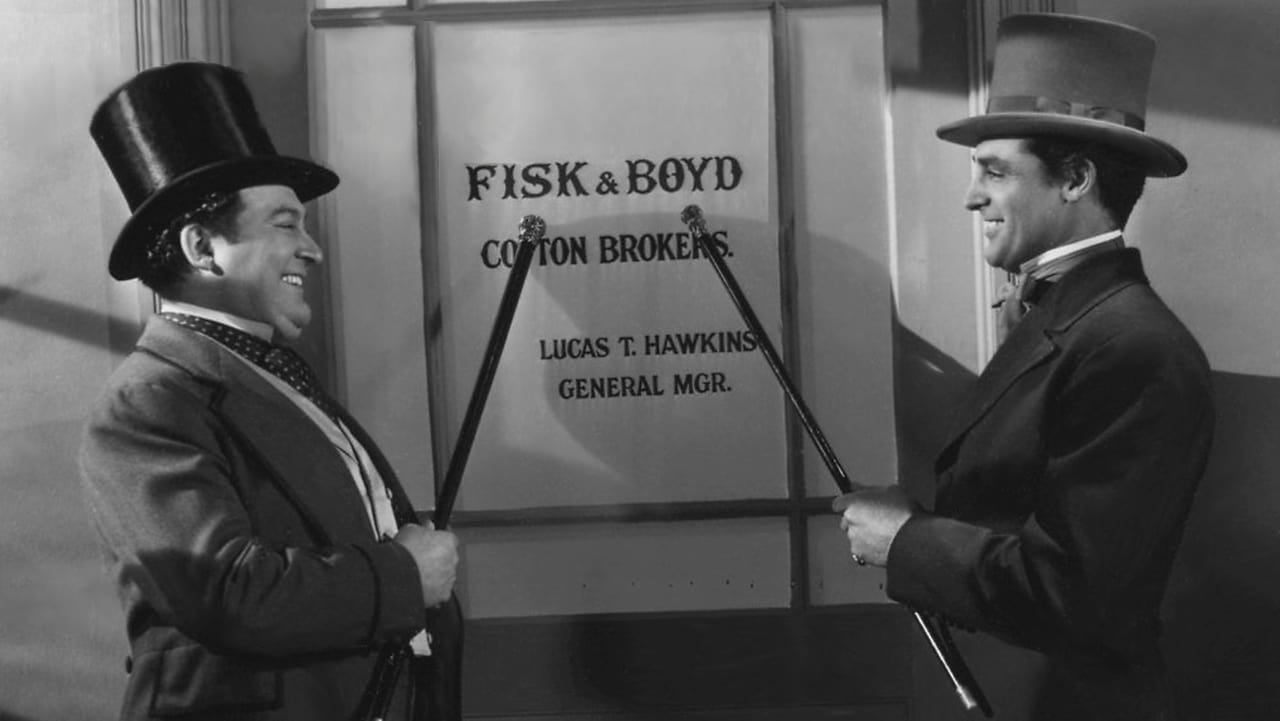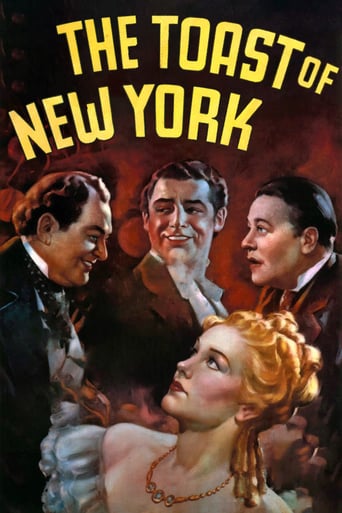LastingAware
The greatest movie ever!
Konterr
Brilliant and touching
Murphy Howard
I enjoyed watching this film and would recommend other to give it a try , (as I am) but this movie, although enjoyable to watch due to the better than average acting fails to add anything new to its storyline that is all too familiar to these types of movies.
Lucia Ayala
It's simply great fun, a winsome film and an occasionally over-the-top luxury fantasy that never flags.
MARIO GAUCI
This makes for interesting viewing in the wake of Martin Scorsese's THE WOLF OF WALL STREET (2013), even if I only intend checking that one out in time for the Oscar ceremony next month! It is the biopic of 19th century American financier Jim Fisk – a larger-than-life Edward Arnold – who rose to prominence from nothing but ultimately grew too big for his boots.The film has a nice period flavour, punctuated by the initial comedy sense of Fisk's petty swindles (done in cahoots with partners Cary Grant and Jack Oakie). Their fortunes turn during the Civil War, but Fisk's ambitions are set too high (taking on mild-mannered tycoon Donald Meek and Clarence Kolb as the famed Cornelius Vanderbilt) and his ruthless tactics certainly do not endear him to rivals and 'victims'. Eventually, Grant himself steps out to oppose him: though this has just as much to do with his personal feelings towards Fisk's girlfriend (played by the tragic Frances Farmer) – whom he at first frowns upon but then falls for (when pushed by Fisk himself to take care of her for him, while he is busy making more money for the two of them!).The whole is typical Hollywood entertainment of the era, the heyday of the biopics (though Warners had cornered the market in this field, the film under review is an RKO production) – even if the subject matter proves necessarily heavy-going to the casual viewer. The sheer professionalism with which this is made also extends to the bit parts – which, surprisingly yet very amusingly, include two of the most likable foils in the classic comedies of Laurel & Hardy, namely Billy Gilbert as a flustered (what else?) photographer and James Finlayson (curiously unbilled) as one of the myriad inventors who turn up at Fisk's firm hoping to be financed.
Robert J. Maxwell
The story of one of the Gilded Age's most colorful figures, the multimillionaire Jim Fisk (Edward Arnold) and two of his fictional partners, Cary Grant, who is there to wind up with the girl (Frances Farmer) and Jack Oakie, who provides whatever laughs are left over after Arnold and Grant are finished howling with glee over their own twisted schemes to make a fortune.It's a story with an ignoble message -- making scads of money by being ruthless, lying, treacherous, and philistine, is fun. Want to be happy? Keep your mind focused on being greedy. Well, it's not true. I've been ruthless, lying, treacherous, and philistine all my life and look where it's gotten me -- an abandoned railway car in the middle of the desert. Maybe I wasn't greedy enough. I've always regretted dropping that handful of pocket change into the kettle of a Santa Claus in New York. It was the tintinnabulation of his bells that got me. I've tried to make up for it by being as philistine as possible, papering my walls with Gustav Klimt posters, listening to Kenny G, but nothing works.So if you're looking for philosophical advice, you won't find it in this movie. But if you're looking for a whiz-bang biography of a couple of guys amassing a fortune and laughing all the way to the bank until one of them winds up paying the piper, this may be it.Rowland V. Lee's direction is nothing special but Edward Arnold practically embodied the sneaky rich guy of 1930s movies in such works as "Meet John Doe" and "Come And Get It." He's got the boisterous laugh of the self-satisfied, selfish, careless mogul down pat, although, to be honest, he looks like he should be running a butcher shop in Geldgierig-am-Rhein or someplace. I suppose Yorkville would do.There was a burst of interest for some reason in biographies of famous men and women in the Great Depression of the 1930s and a lot of the subjects were self-made men, inventors, financiers, and the like. Maybe, at the time, they represented wish-fulfilling fantasies on the part of the audience -- pleasant dreams with a golden cast -- which would have been a big improvement over the cadaverous green of their everyday nightmares.
theowinthrop
In my opinion the finest character actor of the 1930s - mid 1940s was Edward Arnold, whose tragedy (although he would not have seen it that way) was that his acting career was not in a period when leading men (with the exception of the Englishman, Charles Laughton) could be fat. Arnold gave first rate performances time and time again in straight dramas and comic parts. But he was plump, in an age when you hoped a make-up man could make you look like Tyrone Power (as the original lyrics of Hooray for Hollywood suggested). Still he got quite some milage out of his abundant acting talent, expecially playing historical rich men: Diamond Jim Brady (in two films), General John Sutter, and here - "Col." James Fisk, Jr. And his performance, abetted by Frances Farmer, Cary Grant, Jack Oakie, Donald Meek, and Clarence Kolb, makes this film stay alive. It is an entertaining film - but is it historically correct.Well, it has some of the facts (although it's basis in Matthew Josephson's left wing histories of finance are barely correct). Fisk was a greedy man - no denying it. He did get involved in fighting Vanderbilt (allied with "Uncle Dan'l" Drew)in getting control of the Erie Railroad. He did flee to New Jersey with the printing press to continue printing shares of Erie stock away from Vanderbilt's legal writs. He did try to corner the gold market. And he did romance Josie Mansfield (Farmer). But Vanderbilt was no saint - he was as ruthless as Fisk. Drew was a pretty slippery customer too (here seen to be too easily cowed or frightened). Missing here is Fisk's real partner in cunning (apparently also a really close friend too) Jay Gould. Why he isn't in the film is curious. So is the muted character played by Cary Grant. Grant is Ned Boyd, and aside from being an early ally of Fisk, and later his chief critic (in the Gold Panic), he has little to do but pine for Mansfield. In reality, the character is based on Edward Stokes, Fisk's former friend and business associate who turned on him, out of jealousy, and with Mansfield blackmailed the man - or tried to. Stokes would eventually shoot Fisk (who in real life did fall down a staircase, but in a hotel). Fisk died in 1872. One day his tragic betrayal and death would make an ideal movie. But Arnold can't play it - alas!!
FilmFlaneur
This is an entertaining film which, the further it strays from the world of Wall Street, the less interesting it becomes. At the centre of the drama is Jim Fisk, played by the avuncular Edward Arnold - a larger than life performance entirely suitable to the role. He largely dominates the film overawing Cary Grant (Nick) and Jackie Oakie (Luke), who are frequently reduced to the level of stooges. Fisk is a financial gambler, half-crook and a self-centred visionary, whose exploits (assuming the plot reflects something of historical truth) demanded an actor with the right sort of presence. Fisk's attempts to get rich quick are amusing and dynamic but, as soon as his romantic interest is ignited by Josie, the audience finds dramatic tension slackening off. Arnold's loveable rogue persona also serves to deflect any criticisms of his actions, the repeated speculation without conscience, which presumably leaves small investors and stockholders ruined. All of this related misery of course happens off screen and the human cost is largely swept under the carpet (although Josie does express concern for the "little people" for whom Fisk's actions have "cost their lives" towards the end). One couldn't see this film, with its casual treatment of capitalism, appearing during the Great Depression when sensitivities were different. It would certainly make an excellent vehicle for Marxist analysis.Grant has little to do. Nick's secret love for Josie is a curiously passionless affair, their mutual attraction telegraphed so far in advance it becomes a fait accompli in the eyes of the audience, without the principals having to do very much to prove it. Like Fisk, Luke, Drew, Vanderbilt, and all the other men in the picture, real vitality is gained by exposure to stocks and bonds than any sensual consideration of the opposite sex. Fisk's attraction to Josie, although a major event in his private life, is always just a corollary to his business interests - a distraction which Nick recognises and condemns. Later on Nick has another reason to discourage the liaison, but the absence of any true rivalry between Fisk and Nick for Josie's affections robs this side of the drama of any excitement. As Josie, Frances Farmer's innate cool beauty as an actress rises above all this romantic froth, but there is never any real sense that she and Fisk have much in common, no matter how much the script suggests otherwise. In short, their romance is as hollow as Fisk's conscience, and only his amiable sincerity rescues him from a charge of cynicism..The best parts of the drama lay with the big set pieces, rather than intimate moments between the principals. The gold corner, the rout of the ruffians by hose, the dash to the ferry, and Luke's incompetence on the parade ground, all stand out as amusing and well mounted, presumably reflecting where the studio's time and money was invested. One particularly relishes the rotund Fisk, dressed in his militia uniform, trying to bring the stock market to its knees like some fat Napoleon of finance. The duping of Drew, the three charlatans pretending to hold a board meeting while the transport magnate stews, is the finest bit of 'business' in the film.Trivia addicts may notice the presence of Billy Gilbert and James Finlayson down the cast list, both favourite regulars in Laurel and Hardy comedies. Finlayson in particular milks his small part (as the inventor with the self raising hat) so successfully that one regrets that he wasn't offered the larger part of Drew, where the grouchy meanness required is tailor-made for his persona. (Come to that, imagine Oliver Hardy as Fisk!)SPOILER
"I thought I was bigger than any of them" reflects the bankrupt Fisk at the end as his grandiose plan collapses. His ensuing drop down the stairs, victim of an angry stockholder's bullet, is as much a physical representation of his financial fall from grace as it is anything else. (Ironically, it reminded me of the famous picture of Gordon's murder by the Mahdi at Khatoum.) But the conclusion of the film risks another descent - this time into bathos. His end is not so much tragic as formulaic, as there was nowhere else for the plot to go, and consequentially the resolution has little impact. Josie's sadness as she stoops by the dying man's side lacks real grief. There is a feeling that, as the fat financier dies with a smile and a quip on his lips, he has received a mild rebuke from the fates rather than any real come-uppance. His life has been just another investment that hasn't worked out, and the loveable scoundrel is free to continue his wheeler-dealing in the afterlife, not really bothered by his own demise. The viewer is left with a facile conclusion, barely satisfying beyond the shallow requirements of dramatic closure.

